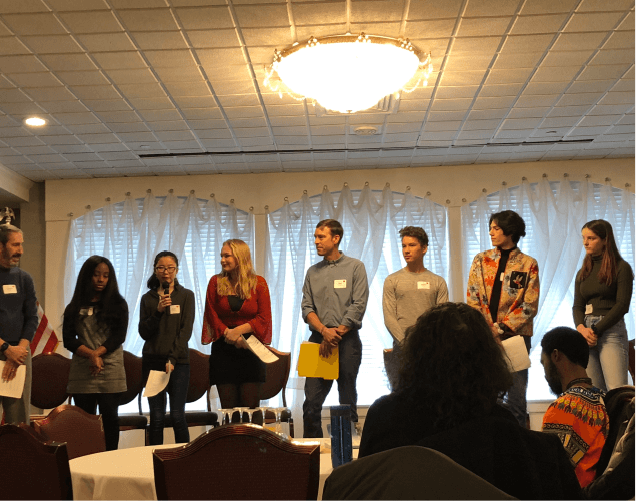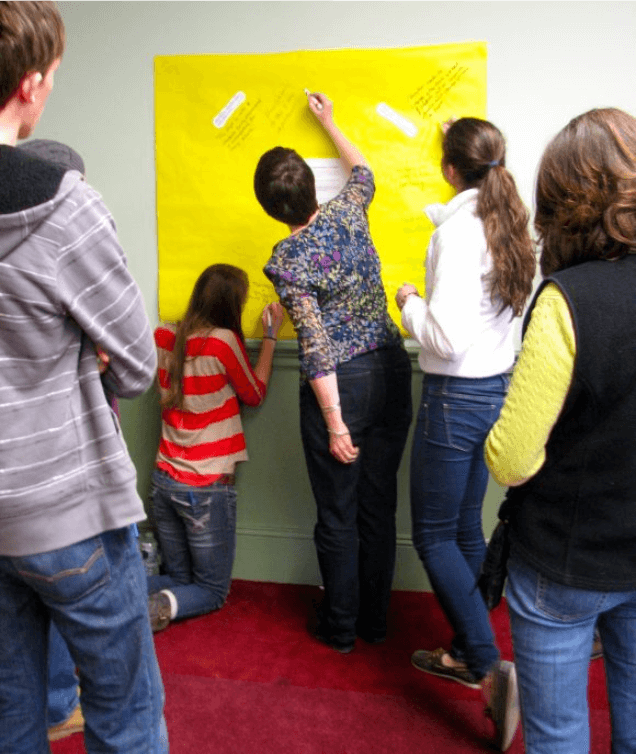learn more about our summer learning opportunities

“Turning to One Another” by Margaret Wheatley, is a poem we regularly use in our work with youth-adult teams as a way of fostering our foundational belief that every youth has the capacity to innovate, collaborate and lead, to become an agent of change now and for future generations. The ways of being found in the lines of Wheatley’s poem relate to all aspects of a youth adult partnership and the possibilities for positive change in the larger educational system.
When the youth-adult team begins to discover what it cares about, begins to ask what’s possible, and has conversations that matter, the seeds for lasting change get planted. Unfortunately, this model is not always seen in schools. Instead, all too often, students are overlooked as co-constructors of learning and players in education redesign. There remains a pervasive societal belief that youth are not yet ready or wise enough to contribute in a meaningful way. After working with youth-adult teams for more than 12 years, we have learned that this could not be further from the truth.
These result arise out of authentic partnerships between educators, who bring a wealth of professional expertise to school redesign efforts, a systems level perspective, and a wide array of skills accrued over time, and youth, who a perspective of the learning experience adults cannot fully fathom, and have the wisdom, creativity, and proven capacity to partner in school remodeling efforts, ensuring its integrity. We find that young people are highly invested in shaping the world that will hold their life story and they possess a deep desire to make a difference now.
The integrity of this working partnership is tied to mutual respect, equity in an on-going exchange of ideas and input, and shared responsibility. When young people are challenged to bring forth their best efforts, adults similarly rise to the occasion. Both parties grow in their understanding and commitment to change, grappling with the complexity of the school change process from the diverse perspectives of both key stakeholder groups. Youth-adult partnership unleashes a previously unknown source for problem solving and change.
Communications wisdom tells us that the “messenger” matters in building public understanding and support for change. When young people address community groups, teachers or their peers on behalf of change, people often unlock their defenses. They remind us that, across generations, we share the deepest of desires regarding education, thereby opening the door for change.
As Wheatley says, “Trust that meaningful conversations can change your world.”


Agency is the ability to make intentional choices about, and take an active role in, the course of one’s own life and on behalf of others’ lives. It happens when youth and adults join together as partners in learning and decision-making. This tool provides a means to understand, assess, and monitor youth-adult partnership and the sense of personal control and agency young people and adults have in the educational setting.
At UP for Learning, we believe we all must play our part in uprooting and rebuilding the systems behind inequities.
For our part, we commit to continuing our work to become an inclusive, anti-racist organization and community. We commit to continuing to listen, change and grow.
Creative material developed by UP for Learning is protected under a Creative Commons Attribution- Non-Commercial 4.0 International License.
We strive to make our website accessible to all audiences, including those with disabilities.
![]() For more information: [email protected]
For more information: [email protected]